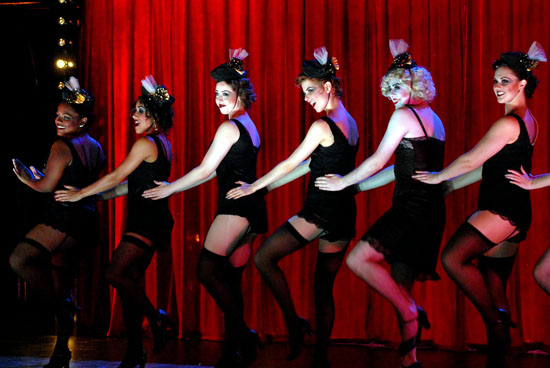It’s Berlin, 1931. Boys are kissing girls. Boys are kissing boys. And girls are kissing girls. Throw in a couple of love stories, the rise of Nazism, and a handful of songs and you have the perfect set-up for a musical.
More specifically, you would have the perfect set-up for “Cabaret,” this year’s offering from UCLA’s Ray Bolger Musical Theater Program, a branch within the School of Theater, Film and Television. The play opens tonight at the Little Theater, located in Macgowan Hall, where it will enjoy a nine-day run. “Cabaret” won multiple Tony Awards for both its 1966 debut as well as its 1998 revival. As a UCLA production, the musical will exclusively feature UCLA students as they bring prewar Berlin to life.
“The story is about two relationships between Sally and Cliff and Fraulein Schneider and Herr Schultz. Within both sets of those, they’re attempting to create a lasting commitment of love to each other. The circumstances of the world ““ the encroaching fascism ““ basically prevent that from happening,” said Jeremy Mann, who is the play’s director as well as director of singing for the Ray Bolger Musical Theater Program.
“Cabaret” divides its time between Fraulein Schneider’s boarding house and the Kit Kat Klub. While both are located in Berlin’s Nollendorfplatz, an area that has been an active cradle of the city’s gay community since the 19th century, Schneider’s boarding house attempts to be a bastion of conservative propriety, whereas the cabaret club encourages the characters’ sexual liberation, which sometimes results in irresponsible and debauched folly.
“Cliff takes us into both worlds. Cliff gets seduced into the world of the club and then the club encroaches upon the world of the boarding house. That is somewhat of a metaphor of the encroaching fascism. … The Nazis were starting to make some great gains not only politically, but on the streets,” Mann said.
“The Nollendorfplatz … was a super bohemian utopia. There were apparently 40 gay bars or something in that one area so it was already kind of progressive and bohemian and decadent and that would certainly have encroached upon the world.”
Stylistically, both worlds differ from each other in purpose, music, movement, and dialogue. Mann explained that the boarding house scenes focus on the characters’ interactions with each other and feel very organic, whereas the segments at the Kit Kat Klub are written as commentary on the play’s main action and delivered in a heightened state.
“The moment of song is a heightened moment. … The characters have no other choice but to sing because of the high stakes and the urgency and the emotional import of the moment,” Mann said. “The club numbers are ultra-heightened because it’s a nightclub. It’s not an A-list nightclub, but it’s attempting to be fabulous.
According to Jane Lanier, the show’s choreographer, “Cabaret” will showcase a darker, more sensual musical production than the typical Rodgers and Hammerstein musical.
“There was a lot of decadence in the period so pretty much anything goes. It’s sexy and it’s dirty and there’s a lot of seduction. It’s about as opposite as you can get from Rodgers and Hammerstein,” Lanier said.
Lanier used the number “Mein Herr” as an example of her jazzy Bob Fosse-inspired choreography. Sally and six other cabaret girls spend the whole song on chairs, shifting through awkward positions. At one point, they have to sing hanging upside down.
“I call that the girls-on-Pilates number because it takes a lot of strength and control while … on those chairs. It’s been fun, but hard for the girls,” Lanier said.
The sensuality of “Cabaret” has existed since its debut, although subsequent revivals of the show revamped its sexuality, notably the 1998 revival under Sam Mendes’ direction. And while Mann shirks the notion of comparing his production to Mendes,’ he makes sure to not shy away from the musical’s overtly sexual content.
“At the college level, we’re teaching and getting them ready to go into that real world and showing them what will be expected of them. … You need to learn to tap into all different sides. For example, to do a sweet Rodgers-and-Hammerstein or to do a darker, more sexual “˜Cabaret.’ You have to be versatile enough to be in both,” Lanier said.
Nicholas Tubbs, a fourth-year theater student who plays the role of Herr Schultz, commented on his experience as an actor in “Cabaret” as well as at UCLA in general.
“I think it’s prepared me very well. I think that the way that theater productions run is very professional,” Tubbs said. “It ranks at the same level, if not higher, than the professional things that I’ve done.”
Tubbs, who will graduate in June, sees similarities in his life and that of his character’s, Herr Schultz.
“There’s this dread, but also this forced optimism that things will eventually, in the end, work out,” Tubbs said.
It is the characters’ debate between change and stagnation that drives the plotline.
“That’s the essence of the story. A huge part of it for me is about complacency and when radicalism is happening … it’s the moment that people who aren’t radical stand up and say, “˜We have a problem here’ and do something about it,” Mann said. “All the main characters have to deal with that question by the end: Do I stay and fight? Or do I get the heck out of Dodge before things get even worse?”
